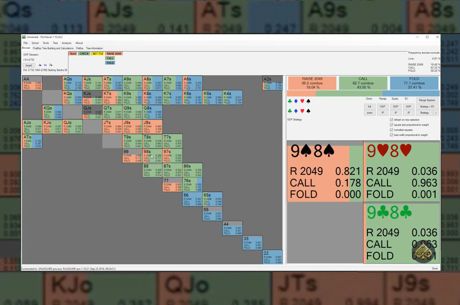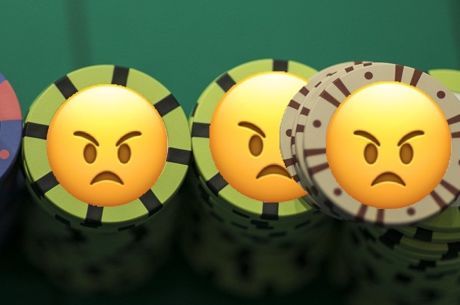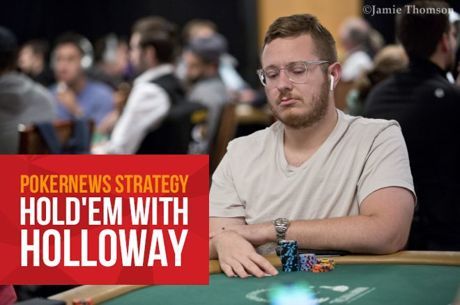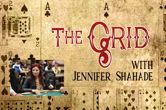Lessons From the Poker GRID: The Anchoring Effect, Idea Bink & Sandbagging
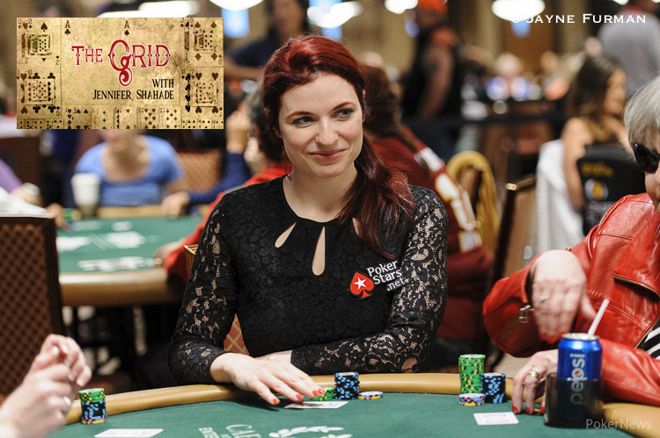
Editor's note: Poker pro and chess champ Jennifer Shahade hosts the popular strategy-based podcast "The GRID" �� a "169-hand scavenger hunt" in which each episode features her interviewing a different guest who discusses having played one of the 169 possible starting hands in Texas hold'em. In "Lessons from the Poker GRID," Shahade shares insights gained from her discussions with poker's brightest minds and most interesting personalities.
In this article, I'll show you how poker is exactly like life without making you want to dump hot sauce in your eyes.
1. Bluff Away
If you can't recall a lot of bluffs that left you embarrassed and empty handed, it's probably not only because you're a masterful bluffer with perfect bet sizing and great reads �� you're also not bluffing enough. Rack up periodic snapped-off river bluffs like a writer papers her room with rejection notes.
Poker has taught me to remain aware of those moments when I am just coasting by, or not taking enough risk. I now look for signs of intertia in all aspects of my life, from preflop strategy to negotiating to fundraising.
Aiming high came up on my episode with mixed games wizard Jake Abdalla, who covered a high stakes heads-up hand he played against Phil Ivey with eight-deuce suited. Jake suggested I get Phil on the show to talk about the hand from the other perspective. An unlikely get, I said, to which Jake replied: "You miss all the (flops) you don't take."
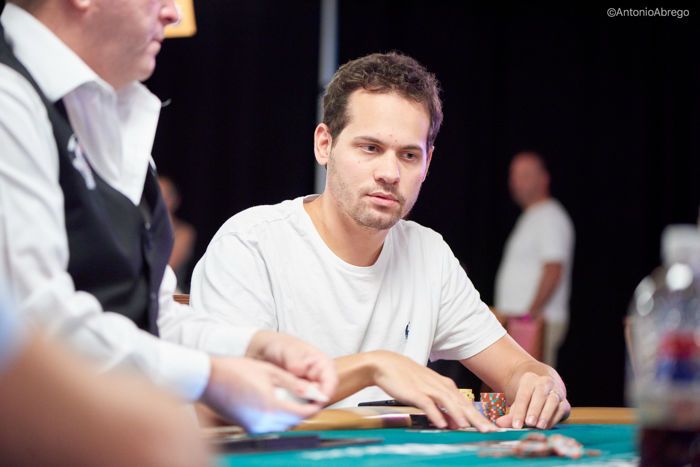
I set myself a goal of 10 big life "nos" by the end of the year, and I'm happy to say I'm almost there. Would you like a pickle sandwich?
2. Idea Bink
In my interview with author and investor James Altucher, also a games aficionado and ranked US Chess Master, we talked about his popular advice to build creativity by concocting 10 ideas per day. When making his recommendation to make such lists, he elaborated by explaining how (with pen and paper), what (lists), and why (to build idea muscle).
When our episode debuted, Joey Ingram tweeted in response:
James 10 ideas/day theory was a big help to challenging myself to come up with outside the box ideas.
— Joey Ingram ???????? (@Joeingram1) October 18, 2019
I've come up with some zany projects over the years from "Chess Bitch," "Hula Chess," the "Poker GRID," and "Kindergarteners Teach Chess." For each one in a museum or a bookstore, dozens more are buried in my idea cemetery, right next to my even larger MTT cemetery.
3. The Upside
"I don't like money to rent real estate in my head," James said, referring to how he only wanted a small percentage of his net worth in any investment. Poker players similarly use bankroll management to limit risk of ruin, but part of the game is tangling with the glorious right tail. Whether by investing early in crypto or having a run in a large field tournament, learning to build relentlessly and analytically when encountering good luck is an underrated poker and life skill.
A favorite example of mine comes from chess. US Women's Champion Jennifer Yu entered the final round of the 2019 Championship a point-and-a-half ahead of the field. She didn't need to play a move to win the title. And yet she did, and she defeated one of the strongest players in the field, Carissa Yip.
By contrast, on both occasions when I won the US Women's Championship, I clinched prior to the last round and lost the final battle. I was so excited I couldn't focus. On my chess podcast, "Ladies Knight," I asked Jen about how she found that ultimate fire. She said it was even more important to win once on top.
That's what a champion does �� wins.
4. Anchor You
There's a poker-is-like-business clich�� that says being in position is just like giving the final number in a negotiation. The "anchoring effect" suggests the exact opposite, that it can be a huge edge to choose a large number to open a price or salary conversation.
For example, if I tell you this giant donut pillow costs $200, you may laugh in my face, but then jump at a chance to purchase an ordinary pillow at the inflated price of $40. James and I talked about how anchoring may apply to poker in leading out, or as we said before solvers, "donk-betting." It could confuse an opponent into calling, where they'd normally bet a different size if checked to.
But position has a value in poker that doesn't always apply to real life �� you can check down to see another card, or powerfully tap the table to grab your pot share on the river. BAM!
5. Avoid Zeroes
In a blog post that influenced me, James pinpointed a key skill in negotiation: using a formula to determine a specific ask, for instance when seeking a pay raise from $75,000 to $88,400. By contrast, asking for a raise of exactly $10,000 or rounding your salary up to a neat number is an example of "unit bias" and may make you seem less prepared, as well as less emotionally attached to a certain number.

Applying this idea to poker, value bets use precise sizes, while more splashy round numbers are used for bluffing (when still at level one of a leveling war, that is �� at level two, the opposite could apply). I look out for this one at live tourneys, even when my only read is that my opponent is so annoying he bet 5,075 when I have no green chips.
6. "How Do You Roll?"
Three-time World Series of Poker bracelet winner Matt Matros pulled an all-nighter when studying for the 2013 National Heads-Up Poker Championship where he faced Brian Hastings in the first round. A high-stakes heads-up coach encouraged Matt to add four-bet bluffs to his preflop range, including with jack-deuce suited, a fateful hand that landed on the GRID five years later.
James similarly added unpredictability into his poker game by always playing eight-five offsuit like pocket aces, illustrating this in a colorful hand history from a game he played at the Mayfair Club in New York a couple of decades ago.
Shortcuts like these can be super helpful in executing poker theory. For instance, if there is a spot where you want to bluff suited wheel aces at a 20% frequency, that's 16 combos, 20% of the time. That averages to about three combos, so you could pick A?5?, A?5?, and A?3? with which to bluff. Or round up to all heart combos, in case you lose your heart once in a while.
[Removed:412], Jake Abdalla, and Dan Smith all talk about randomizing at high stakes where ranges are more thoroughly mixed, using a random number generator or checking the second hand of your wristwatch.
This may sound nerdy and unnecessary, but 45, 33, 19, 6, 28.
7. Sandbagging
James also described an example of under-playing his own financial acumen once when he entered a meeting. "I'm just a casual negotiator �� you're the negotiation genius �� what would you do if you were me in this situation?" he said.
In poker, crafting a straightforward image can help you get away with murder. Guests Jamie Kerstetter (AA), Maria Konnikova (72o), and Helen Ellis (78s) all elaborated on this idea in their GRID stories.
8. No Gamble, No Book Deal
The aforementioned Helen Ellis is the hilarious author of American Housewife (2016) and Southern Lady Code (2019). In 2013, she coached Pulitzer Prize winning author Colson Whitehead during his quest to crush the WSOP Main Event. Whitehead included a memorable description of Ellis in his resultant book, The Noble Hustle.
"The housewife-player was an unlikely sight.... The dudes flirted and condescended, and then this prim creature in a black sweater and pearls walloped them. 'A lot of people don't think women will bluff,' Helen said. She was bluffing the moment she walked into the room," writes Whitehead.
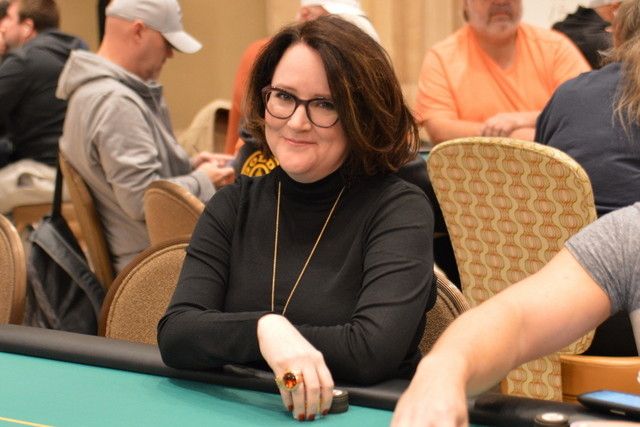
Soon after her work with Whitehead, Helen described a creative rebirth in a line that gave me chills: "The book reminded me that I was brave."
Maybe we all need reminders of what we're capable of (drug-free childbirth anyone?). As many nits like me have learned, whether it's improving your fitness, managing a career, or growing your money and your chip stack, too few risks is the biggest risk of all.
Jennifer Shahade is a chess champion, PokerStars Ambassador, and advocate for bringing more girls and women into chess via her books and work with US Chess Women. She is a commentator for the Grand Chess Tour, and hosts two podcasts, Ladies Knight and The Poker GRID, a 169 episode podcast and scavenger hunt to click off every cell on the poker grid. The GRID recently featured PokerNews' own Martin Harris, and you can subscribe here.
The Stars Group owns a majority shareholding in iBus Media.

